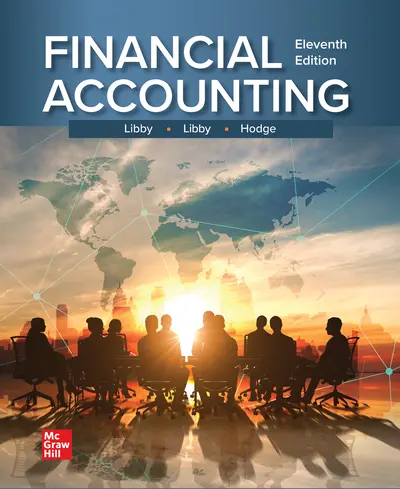My Account Details

ISBN10: 1264229739 | ISBN13: 9781264229734

* The estimated amount of time this product will be on the market is based on a number of factors, including faculty input to instructional design and the prior revision cycle and updates to academic research-which typically results in a revision cycle ranging from every two to four years for this product. Pricing subject to change at any time.
Instructor Information
Quick Actions (Only for Validated Instructor Accounts):
Libby/Libby/Hodge wrote this text based on their belief that the subject of financial accounting is inherently interesting, but financial accounting textbooks are often not. They believe that accounting is an exciting field of study and one that is important to future careers in business. When writing this text, they considered career relevance as their guide when selecting material, and the need to engage the student as their guide to style, pedagogy, and design.
Financial Accounting 11e successfully implements a real-world, single focus company approach in every chapter. The companies chosen are engaging and the decision-making focus shows the relevance of financial accounting regardless of if a student has chosen to major in accounting.
Libby/Libby/Hodge believes in the building-block approach to teaching transaction analysis. Most faculty agree that mastery of the accounting cycle is critical to success in financial accounting, and yet most financial texts introduce and develop transaction analysis in one chapter, bombarding a student early in the course with an overload of new concepts and terms. The authors slow down the introduction of transactions, giving students time to practice and gain mastery. This building-block approach leads to greater student success in their study of later topics in financial accounting such as adjusting entries.
Focus Company: Le-Nature’s Inc.
CHAPTER 2: Investing and Financing Decisions and the Accounting System
Focus Company: Chipotle Mexican Grill
CHAPTER 3: Operating Decisions and the Accounting System
Focus Company: Chipotle Mexican Grill
CHAPTER 4: Adjustments, Financial Statements, and the Closing Process
Focus Company: Chipotle Mexican Grill
CHAPTER 5: Communicating and Analyzing Accounting Information
Focus Company: Apple Inc.
CHAPTER 6: Reporting and Interpreting Sales Revenue, Receivables, and Cash
Focus Company: Skechers U.S.A.
CHAPTER 7: Reporting and Interpreting Cost of Goods Sold and Inventory
Focus Company: Harley-Davidson, Inc.
CHAPTER 8: Reporting and Interpreting Property, Plant, and Equipment; Intangibles; and Natural Resources
Focus Company: FedEx Corporation
CHAPTER 9: Reporting and Interpreting Liabilities
Focus Company: Starbucks
CHAPTER 10: Reporting and Interpreting Bond Securities
Focus Company: Amazon
CHAPTER 11: Reporting and Interpreting Stockholders’ Equity
Focus Company: Microsoft
CHAPTER 12: Statement of Cash Flows
Focus Company: National Beverage Corporation
CHAPTER 13: Analyzing Financial Statements
Focus Company: The Home Depot
APPENDIX A: Reporting and Interpreting Investments in Other Corporations
Focus Company: The Walt Disney Company
APPENDIX B: Target Corporation, Form 10-K Annual Report
APPENDIX C: Walmart Inc., Form 10-K Annual Report
APPENDIX D: Industry Ratio Report
APPENDIX E: Present and Future Value Tables
Accessibility
Creating accessible products is a priority for McGraw Hill. We make accessibility and adhering to WCAG AA guidelines a part of our day-to-day development efforts and product roadmaps.
For more information, visit our accessibility page, or contact us at accessibility@mheducation.com
Need support? We're here to help - Get real-world support and resources every step of the way.